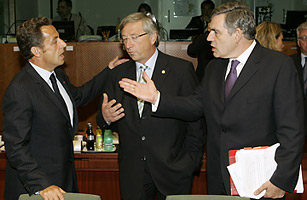
French President Nicolas Sarkozy, left, shares a word with British Prime Minister Gordon Brown, right, and Luxembourg's Prime Minister Jean Claude Juncker during a round table meeting at an EU summit in Brussels, Monday Sept. 1, 2008.
Like so many gatherings of European Union leaders, the Georgia crisis summit held in Brussels Monday was flush with grandiose rhetoric but in the end short on substance.
The leaders found the words to describe Russia's "disproportionate reaction" to the violence in its Caucasian neighbor, and to "firmly condemn" Moscow's recognition of South Ossetia and Abkhazia. But apart from suspending talks on a trade pact, they shied away from sanctions, conceding that the E.U. and Russia's interdependence meant "there is no desirable alternative to a strong relationship."
French President Nicolas Sarkozy, holding the E.U.'s six-month rotating presidency, promised that ties with Russia would have to re-examined. "You need two for a partnership," he said. Sarkozy will lead an E.U. delegation to Moscow on September 8 to ensure Russia complies with the peace plan he helped broker last month.
British Prime Minister Gordon Brown said there could be no more "business as usual" with Moscow, and said all 27 member states were united in their condemnation of Russia's "aggression" against its smaller neighbor.
The E.U. is prepared to send monitors, but not a peacekeeping force, to South Ossetia. And it will send humanitarian aid to help rebuild the war-torn regions. But officials did not even pretend that this would be enough to send a strong message to Russia about the E.U.'s vigilance.
The limited E.U. response was partly due to splits amongst the leaders. Britain and most of the new E.U. members from the east wanted tough sanctions to punish Moscow. However, even the most bullish amongst them recognized the limited impact of possible measures like blocking Russia's plans to join the World Trade Organization, or throwing it out of the G8.
Germany, France and Italy were more conciliatory, warning that the E.U. needed Russia too much to risk any rash retribution — especially given how reliant much of the E.U. is on Russian gas and oil. "We are economically interdependent with the Russians: Russians need our market, we need the Russian market," Finnish Foreign Minister Alexander Stubb said.
The result was familiar fudge: a common statement that tried to sound tough without actually threatening real damage. The fiercest it got was to say, "In the meantime, the Union will not take any action to reinforce the relationship with Russia." Instead of projecting common resolve in the face of Russian it seemed to reinforce the sense of impotence felt by the E.U. — like the U.N. and NATO and other international organizations — in the face of Russia's actions.
One veteran E.U. official said the Brussels summit underlined how weak the E.U. is. "It is like the chorus in a Greek tragedy," says Pierre Defraigne, the European Commission's former deputy director-general for trade. "The lesson to be drawn from this is that the E.U. needs its own defense capabilities, and it needs a common purpose on energy."
But there was at least a new recognition that the E.U. had reached a crossroads in its relationship with Russia. Russia's actions have seriously challenged the E.U.'s long-held belief in "soft power," its ability to influence other nations by non-military means.
The E.U.'s own defense capabilities are almost non-existent, even when its member countries sing together on foreign policy issues. But since the fall of the Berlin Wall, this has had only limited consequences: there have been few external threats to lay bare the E.U.'s lack of foreign policy credibility.
Now E.U. leaders recognize that the bright, peaceful future promised by the end of the Cold War was perhaps illusory.
"The holidays from history have ended," Polish Foreign Minister Radowlaw Sikorski said, adding that Russia's "imperialism" had been a wake-up call. He also warned that the E.U. — and NATO — had to be serious about its security pledges: they could no longer think of membership as cost-free, but being backed by force.
Even if their Brussels summit produced familiar posturing, the E.U. leaders have learned a bit more to appreciate that unless they show unity and purpose in the face of threats, they will be seen as a pushover by the likes of Russia.